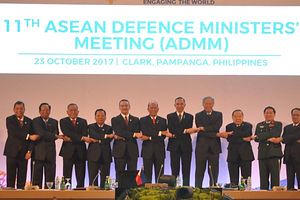On Monday, Southeast Asian defense ministers met in the Philippines for another iteration of their regional defense meetings. Though the agenda in their deliberations – both among themselves and with key regional partners – was expected to be wide-ranging, terrorism was unsurprisingly in the spotlight amid the subregion’s ongoing struggle against the Islamic State (See: “ASEAN’s Islamic State Conundrum”).
Among the hundreds of meetings that the ten-member Association of Southeast Asian Nations (ASEAN) hosts each year, the two key defense ones are the ASEAN Defense Ministers’ Meeting (ADMM), held amongst Southeast Asian states themselves since 2006, and the ADMM-Plus, a newer, expanded biennial version held since 2011 which groups ASEAN members with the United States, China, Australia, India, Japan, South Korea, New Zealand, and Russia. The ADMM-Plus is often referred to as the emerging premier venue for defense and security issues in the region.
This year, the Philippines, which holds the annually rotating chair of ASEAN, is hosting the meetings during the organization’s 50th anniversary. And this week, defense ministers gathered for both the 11th ADMM and the 4th ADMM-Plus in Clark Freeport north of the Philippine capital of Manila.
As is typical of ADMM and ADMM-Plus meetings, the agenda was expected to be wide-ranging, including progress made on confidence-building efforts, discussion around regularly featured areas of cooperation like humanitarian assistance and disaster relief and maritime security, as well as issues of regional interest like the situation on the Korean Peninsula and the South China Sea. The gathering would also include informal meetings between ASEAN ministers and their regional counterparts as well as other meetings on the sidelines by ministers.
But terrorism was unsurprisingly in the spotlight amid recent developments both in the Philippines’ own struggle in the southern city in Marawi as well as more broadly in the battle against the Islamic State (See: “Why Has the Philippines Struggled in its War Against the Islamic State?”). As I had noted last week, the Philippines has seen advances in its battle against Islamic State-linked militants, who had taken control of Marawi back in May, with the killing of two key leaders (See: “ASEAN’s Post-Marawi Islamic State Challenge”).
On Monday morning, Southeast Asian defense ministers began with a special breakfast meeting focused on dealing with the terrorist threat in the region. In his remarks, Malaysian Defense Minister Hishammuddin Hussein reiterated an oft-cited warning that with the setbacks the Islamic State has suffered in the Middle East, the prospect of the group focusing on Southeast Asia was even greater. Counterterrorism also featured in the joint declaration adopted at the meeting by the ministers later that day.
As I have been noting, recent months have seen some key subregional developments in this area, including greater trilateral cooperation forged between Indonesia, Malaysia, and the Philippines in the Sulu-Sulawesi Seas (See: “What’s With the Sulu Sea Trilateral Air Patrols?”). Singapore, which will be taking over the ASEAN chair from the Philippines next year, vowed to make stepping up regional counterterrorism efforts part of its 2018 ADMM chairmanship.
In addition, Philippine Defense Secretary Delfin Lorenzana officially announced the termination of combat operations in Marawi City, saying that the Philippines had “defeated terrorism” even though the ideological struggle would continue. Visiting U.S. Defense Secretary James Mattis praised the Philippines for liberating Marawi and acknowledged that the “very tough fight” had sent “a very strong message” to terrorists.

































